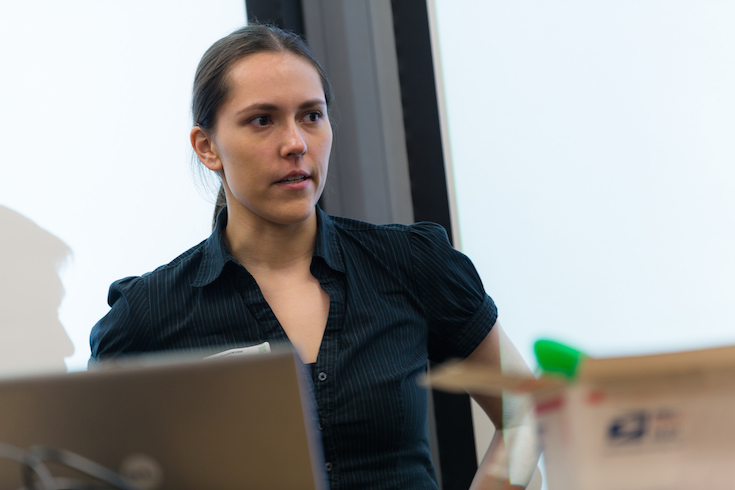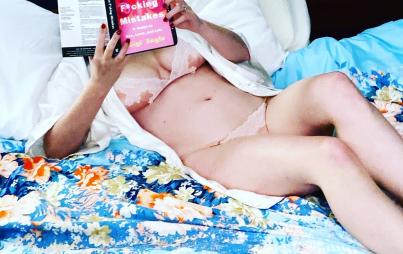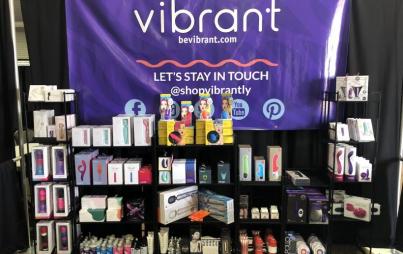
When you hear “Silicon Valley,” you probably don’t think of silicone sex toys. But SmartBod is not your typical Bay Area tech startup: its first product, currently in beta, is an intelligent vibrator accompanied by a Fitbit-like app that track users’ sexual responses.
Co-founder and CEO Liz Klinger started the company to help people learn about themselves and the broad spectrum of female sexuality. She spoke with me about how she grew inspired to de-stigmatize sexuality, what SmartBod has accomplished and hopes to accomplish through the power of the vibrator, and why we should be more careful about our adult toy purchases.
So what exactly does this vibrator do?
On the highest level, our product is meant to help women (or, more broadly, anyone with a vagina) better understand their own bodies and preferences (and, if they choose, to share what they learn with their partners). Specifically, with our app and the embedded sensors in the vibrator, we help track things like how long it generally takes to orgasm and what your pattern of arousal looks like. There are a lot of things we can do with this that we're still discovering ourselves. A wife and husband who beta tested our product found that the info helped them better understand how much foreplay she needed during sex to best enjoy it. Another tester started to better understand what conditions best correlated with good masturbation or sex.
What else have you learned from the people who have beta-tested your product?
A running theme I’ve heard from the people we’ve talked to about their own sexuality is that you “don’t know what you don’t know;” in other words, it can hard to figure out where to start when exploring your own body and sexual preferences beyond what you already know. With people who beta-tested our product, I was pleasantly surprised to see that the same people who told me that they didn’t know what they didn’t know were able to start asking questions they didn’t know they had before and start exploring new things on their own and sometimes with their partners. I can release more information about this when we launch, but for now I’ll say it’s exciting to get this feedback, and I’m really excited to release a product that will help us understand our sexualities in a totally new way.
What changes do you hope to catalyze in women's lives and in society at large through SmartBod?
My goal is to empower more women to learn about their sexualities, both privately and on their own terms. Through SmartBod, I hope to provide more ways for women to discover their own bodies and preferences so they can answer questions they’ve had, but haven’t had anyone or anywhere to ask.
Beyond that, for society at large, I want to raise awareness about female sexuality as a crucial but often overlooked aspect of our own health and well-being as women. In many media channels, female sexuality is still sensationalized and sometimes seems like it exists to be consumed by others. It frustrates me that this is the dominant message, because I don’t relate to it and sexuality can be so much more. We all have a sex drive and desire in some shape or form, it’s part of everyone’s life in some way, and it has many, many health benefits. But this hasn’t become a more prominent message due to stigma, difficulty conducting research studies (also due to stigma), and lack of information to talk about it from this perspective. By making this information more available through SmartBod, we’re hoping to change that and make the sex-positive narrative more prominent.
How did you become passionate about destigmatizing female sexuality?
My passion stems from a bunch of factors. I grew up with conservative parents from the Midwest. We never talked about sex. Not talking about the subject made me feel uncomfortable about the topic of sex and masturbation, especially as it pertained to my own sexuality. That started to unravel as I grew older — I attended Wellesley College, a women’s college, for two years, where I could talk to other women about a bunch of topics and hear many perspectives from people with different sexual orientations and preferences. I learned that there are endless sexual expressions and that, in terms of my own sexuality and preferences, there was nothing to be ashamed of.
However, places like Wellesley are few and far between, and most women don’t have opportunities to ask questions that pertain to their sexual preferences or bodies. While there are some resources that can give general or anecdotal advice, it can be difficult to ask more specific questions about your own body, especially when the most popular advice doesn’t work for you. I learned this when I sold intimacy products in Tupperware-style sales parties. These one-off parties were sometimes the only opportunities some of my attendees had to confide in me about things they’d never spoken aloud and ask questions. These experiences, as well as my own experience, indicated that we needed more ways for women to explore and learn about their own bodies and sexualities privately, and also that we needed to create supportive spaces that allow people to ask the questions they’ve always had but never knew where to ask.

You must have done a lot of research on sex toys. Have you learned anything surprising through this research?
Oh, yes. I’ve learned quite a lot over time! But one thing that people should (and don't) know is that there are very few regulations on materials for sex toys, which means there are still a lot of sex toys on the market that use materials that are not body-safe. It was pretty scary when I discovered this, but chemicals like phthalates that have been highly regulated in other product categories like children’s toys are not regulated in adult toys. I mean, a lot of these go into your body!
I’ve had products that, upon just being in contact with each other in storage for a period of time (and in room temperature, I may add), have heated up, melted, fused to each other, and produced awful smells that I probably shouldn’t be around. These are products that interact with parts of your body that are highly porous, so if these products are chemically unstable in the natural environment of the home, I’d be worried about what they’re doing to our bodies when we use them. The worst part is that a lot of these particularly bad products are super-cheap and accessible, and a lot of people still buy them because they’re unaware that there’s such little oversight on these products.
What has your experience working on SmartBod taught you about running a successful business?
A lot — more than I could describe here — and I’m learning more and more everyday!
Top three things I’ve learned (so far):
1. Find and work with a great, motivated, and passionate team you love. I love my team. We have good chemistry, and our skill sets cover a lot of what we need to run our business (technical and business expertise). Don’t necessarily work with your friends just because they’re your friends, but if you have good work chemistry and they are also your friends, that definitely helps.
2. Combine passion, tenacity, and self-reflection in whatever you do. If you’re passionate about what you’re doing, you’ll be motivated. If you’re tenacious AND passionate, you’ll keep going despite pitfalls (which are inevitable). If you’re also self-reflective, you can look back at your successes and failures to learn how you can do better next time.
3. Work-life balance is a juggle. It’s hard to have a sense of balance in your life, especially when you’re doing something entrepreneurial or unpredictable. Everything is always uncertain, and trying to find certainty is a losing game. Instead of trying to find balance, do the best with what you have and juggle back and forth between work and recreation as you see fit. Admitting that the uncertainty is there, yet finding time for yourself between bursts of hard work, is essential for not burning out.
Has anyone ever taken you less seriously as a CEO because you are a woman, because your company makes a woman-centered product, or because your company deals with sexuality?
It’s happened. Even though we’re making a women-centered product, I still occasionally have people approach my male co-founder before approaching me, and sometimes they don’t approach me at all! I also sometimes have people ask me and one of my co-founders "who is the CEO?” even after they know our company story and my background. It’s definitely annoying, but things like this happen I just calmly let them know I’m the CEO. They usually realize that they jumped to a conclusion based on preconceived notions and feel uncomfortable that they fumbled like that (which can be OK, especially if they learn for next time when something like this happens again with another female-founded company). Rarely do they act unapologetic or rude, in which case they wouldn’t be worth working with anyway.
Another interesting observation I’ve made is that some folks say they don’t know what advice to give me because I’m working on such a “different” product. I get this from engineers, product managers, and other advisor-types I meet. Sure, it's different from a lot of other products out there in subject matter, but at the same time, the fundamental design principles of engaging software and high-quality hardware are the same. I call people out when they say they don’t have any advice for me because I think, for one, a lot of smart people have valuable things to contribute to the sex toy space if they felt comfortable doing so, and secondly, creating such an air of "difference" around the space is part of what creates the taboo and stigma around it.
You can receive updates from Liz and SmartBod by subscribing to SmartBod’s newsletter at www.smartbod.co.







